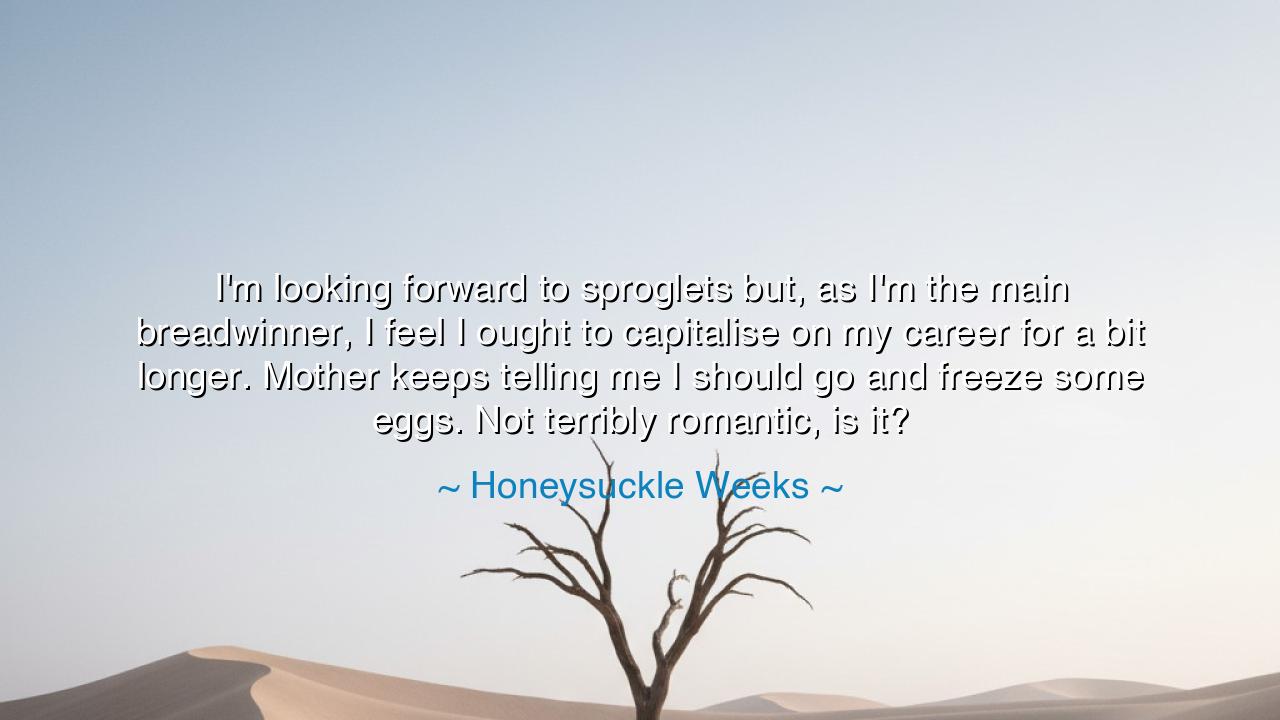
I'm looking forward to sproglets but, as I'm the main
I'm looking forward to sproglets but, as I'm the main breadwinner, I feel I ought to capitalise on my career for a bit longer. Mother keeps telling me I should go and freeze some eggs. Not terribly romantic, is it?






The words of Honeysuckle Weeks—“I’m looking forward to sproglets but, as I’m the main breadwinner, I feel I ought to capitalise on my career for a bit longer. Mother keeps telling me I should go and freeze some eggs. Not terribly romantic, is it?”—strike at the heart of a modern paradox: the tension between love and duty, between the longing for family and the demands of livelihood, between the tender vision of romance and the cold calculations of necessity. In this statement, we hear not only the voice of one woman, but the echo of countless souls who, throughout the ages, have wrestled with the balance between personal dreams and worldly responsibilities.
The origin of this dilemma lies in the eternal struggle of human life: the need to provide and the desire to nurture. Since ancient times, men and women alike have faced choices between the pursuit of survival and the yearning for continuity of life through children. What is new in Weeks’s reflection is the recognition that in the modern age, women, too, carry the mantle of breadwinner, often standing at the crossroads of career and motherhood. The voice here is not selfish but profoundly responsible, acknowledging the burdens of provision even while longing for the sweetness of family.
History bears witness to many such struggles. Consider Eleanor of Aquitaine, queen, mother, and political force of the twelfth century. She longed to raise her children, yet her duties as sovereign and consort compelled her to navigate wars, diplomacy, and power. The romantic vision of motherhood was tempered by the stark reality of responsibility. And yet, through her choices, she shaped not only her family but the course of kingdoms. Just as Weeks notes the unromantic practicality of freezing eggs, Eleanor too lived at the threshold where private longing and public duty collide.
Weeks’s lament that “it’s not terribly romantic” reveals another truth: that the heart yearns for simplicity in love and family, but the modern world often interposes science, strategy, and delay. Yet even here, the romantic spirit persists, for to admit the unromantic is to still cling to the dream of what romance should be. The longing for children—sproglets, as she affectionately names them—remains untouched by the machinery of practicality, reminding us that behind all our calculations lies a heart that beats for love, for family, for continuation.
The lesson here is profound: life is not always as simple as the poets declare, yet even within duty and compromise, romance can survive. To imagine children, to plan for them, even amid the burdens of work and time, is itself an act of love. What matters is not whether the path is strewn with romance or with unromantic necessity, but that the journey is made with sincerity, with devotion, and with the hope of creating something greater than oneself.
Practically, we are called to accept both sides of life’s coin. Embrace responsibility with courage, for provision is itself a form of love. Yet do not let the weight of duty silence the yearning of the heart. If you must make pragmatic choices, do so with eyes fixed upon the deeper dream that guides you. And when the time comes to step into family, whether sooner or later, do so not with regret but with gratitude for the foundation you have built.
Thus, Weeks’s reflection becomes a teaching: that the romantic and the practical are not enemies, but companions on the same path. Life will seldom offer pure romance unshadowed by duty, nor duty unsoftened by romance. The wise soul learns to hold both, and in their balance discovers a love deeper, truer, and more enduring than fantasy alone could ever yield.
So let this truth be handed down: romance is not only candlelight and tenderness—it is also responsibility, sacrifice, and foresight. To love deeply is not merely to dream of children, but to prepare a world in which they may flourish. Even in the unromantic act of planning lies the seed of the most sacred romance of all—the creation and care of life.






AAdministratorAdministrator
Welcome, honored guests. Please leave a comment, we will respond soon